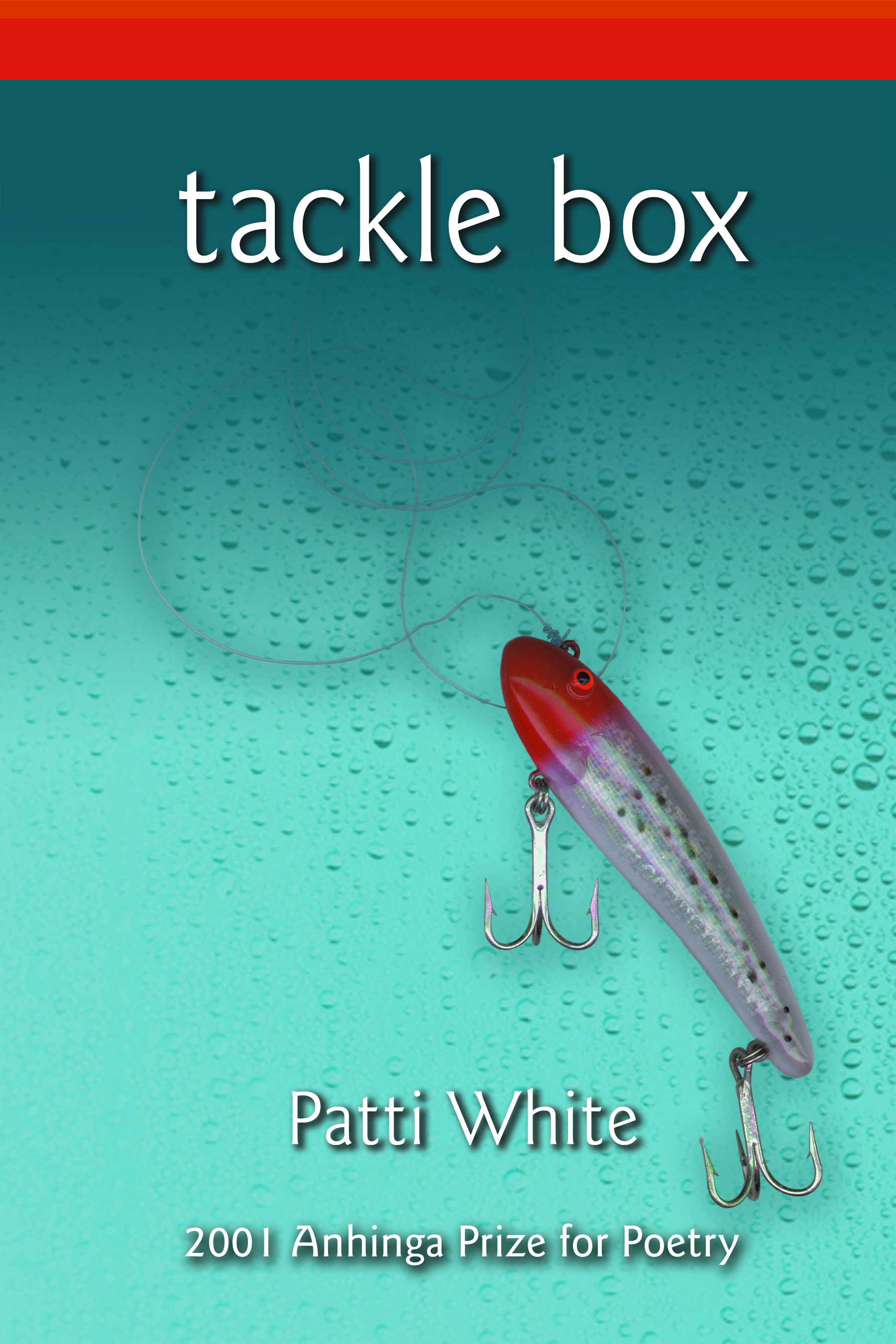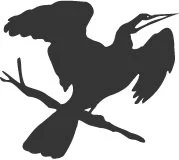
Tackle Box by Patti White
Robert Dana-Anhinga Prize for Poetry (2001)
These poems are the best lures I've picked up in a long time. No - they've picked me up. Patti White can talk tough, but be oh so embraceable. -- Gary Gildner
These poems offer a unique perception of the world, almost primal in their energy and power but, also couched in the sophistication of global myth and literature. Patti White's voice is authoritative, witty, and persuasive. She can take the most trivial subject and give it substance through her imaginative vision. Like a shaman, she offers reverence for life and the living, but this is no soft-focus new age shaman afraid to touch blood or penetrate mysteries. To read these poems is to be invigorated, to feel the possibility of moving outside the confines of one's own narrow personal life. But dynamic vision is not all White offers. Her language is radiant, intensely lyrical at times, in spite of its driving narrative force. Perhaps that is why they seem to be the poems of some Wonder Woman or High Priestess, or the kind of woman we would all be honored to know. -- Diane Wakoski
Tackle Box
People who fish have a peculiar love for equipment,
for paraphernalia, for spatial coordinates,
trajectories, for the tension between surface and depth.
People who fish know there is more to water
than can be seen by the naked eye, more to a lure
than shape and dazzle, more to filleting than a long
sharp knife; people who fish are patient, dedicated;
they understand the relation between desire and deed.
Down in South Florida, an old couple fished together
for fifty years in the green water of the salt bays,
the black water of springs in turpentine country,
the wide flat saucer of Okeechobee, the sweet rivers,
the brackish mangrove swamps, the shallow Gulf where
big rays come to breed in August, the Everglades,
fifty years on the waters of Florida, fifty years
of setting traps for bait, filling the thermos with
morning coffee, checking the barometer, scaling fish.
She had precise notions about ordering her tackle;
she kept her hooks sharp, her bloodstained stringer
neatly wound and stored; she had her own supplies:
Bandaids, Maalox, Teaberry gum, leaders, sinkers,
ten pound test line, red and white bobbers, Coppertone,
aspirin, antibiotic cream, nitroglycerin pills,
so it made sense to him, when she passed away,
to keep her ashes in her tackle box, for love.
One afternoon two thieves came to the trailer
when the old man was away and couldn't believe their
luck.
They came for electrical appliances, carelessly displayed
credit cards or checks, maybe a gold watch or a wedding ring
left lying on the sink after washing up; petty thieves, young,
they came for the obvious, the quick sell to the fence
and found a metal box full of drugs near a rusty bait bucket.
They bolted from the trailer and went directly to Castroville
where Jesus Huerfano purchased the drugs for a reasonable
but not extravagant sum; the thieves walked away with cool cash
and two small packets of white powder for a treat later on.
Jesus made it a rule to sample his product and when he sniffed
he felt the rush, a rather strange sensation, rather glittery,
but certainly, clearly, a chemically induced alteration,
so the drugs went on the street that evening.
Oh that bone cocaine, the soft ash,
so fine, so white, so
insidious. Two weeks later a stock broker found himself
drawn to the Walmart where he stood staring at the lures
for half an hour, the plastic crabs, fluorescent shrimp,
the Bass Rat, Orange Poppers, the Super Guido Frog,
the Rebels, Rappalas, the Mepps Black Fury,
the Daredevils, Silver Minnows, Scattering Shad,
the 6" Twirl Tail Worms. The merchants in town were
surprised
by a run on waders, surf rods, and insect repellent. Charters
rented out to oddly inept men, sniffling trollers whose
needle-marked arms burned in the sun, teenagers
driving BMWs lurked near marinas, and two bait shops
were looted on Sunday night. The two thieves
signed up on a tuna boat and worked the season.
And Jesus Huerfano had dreams of glistening fish
skipjacks and mullet, sheepshead, silvery sea trout,
mysterious redfish, grouper, flounder, and tarpon
he dreamed of fish head soup and grainy oysters
of deep fried snapper throats and conch fritters
he dreamed of soft white sand at the bottom of the sea
and glittering bones that shifted, drifted, so gently,
with the pull of the waves overhead
he dreamed of shining bones
dancing in the current as the fish sailed by.
The Love Zombies
We scorched them the night they came through.
We burned the cornfields under their feet,
poured gasoline down the rows and tossed matches.
They just kept on, lurching toward the farmhouse;
the sheriff said it was love that drew them,
he said they were greedy for the taste of love.
Their need was insatiable, terrible. Dire.
I saw one stop, stop and spread his arms wide
embracing the corn, hugging it to his breast,
so hungry for love he would hold dry stalks
like a cherished woman, so lonely he would
walk through fire to approach a living heart.
The sheriff followed them down the road, blue lights
flashing on their charred coats, siren wailing softly;
we stepped back to let them pass. Blackened, ashy,
they walked barefoot on gravel, on hot coals,
dragging gunny sacks of mementos behind them:
livers, knuckle bones, pressed flowers,
tin can lids, movie tickets, gallstones,
umbrella ribs, moving slow as threshers,
they shuffled along the fenceline, stumbling blind,
away from our precious farms. We never knew
where they went after we burned them out.
I guess they blended with the population;
I guess they went underground in the cities
traveling through utility tunnels, tracing
steam pipes to exclusive apartments, watching
church weddings and old musicals, hiding
behind newspapers, waiting on park benches,
feeding on pizza crusts, feeding on memories,
dreaming of the tiny shoots of green corn,
the lettuce, the spinach, romaine, cool thin leaves
between their toes, dreaming of fullness, the grain
of love swelling their stomachs, hunger satisfied,
life replenished, the cornfields waving to them
across the smoky past, the farmers with open arms,
the harvest ready to be gathered, the hunger
satisfied, the love sheriff leading them home.
Alphabet
Algiers, Louisiana seemed exotic, a dark sexy bayou where
Burroughs nailed together orgone accumulators. Crossing
cottonfields worked by convicts, they high-balled west,
driving through the nights half drunk with stars, writing.
Even the dark hills of Pennsylvania were estranged by
falling rain, the slick and slippery shale of memory.
Ginsberg sent love letters to everybody, regardless,
Huncke, Corso, garbled messages of semen, stamps
inching off the envelope toward California, toward
Jack, and in every line he's screaming out: angel!
Kerouac! the trains in the night! Lovelorn, he mailed
letters; Burroughs answered with persistent insects,
mugwumps conspiring to invade his head like police
nostalgic for torture, like eager surgeons, or lepers
off-loading dead skin in packages wired to explode,
posted traces of kisses from opium dens, the
queers and junkies eating oranges in Tangiers.
Rising poets remember them, read them, take
solace in the beat journey across America, in
the boys sleeping by the side of the word
under the hobo sky, dreaming against the
vanity of form, riding the rails down the line.
What language do they speak, what sweet
X-ray skeleton grammar, what tongue, the
young poets three generations later, tasting the
zest of Burroughs' oranges, in Algiers, wasting.

